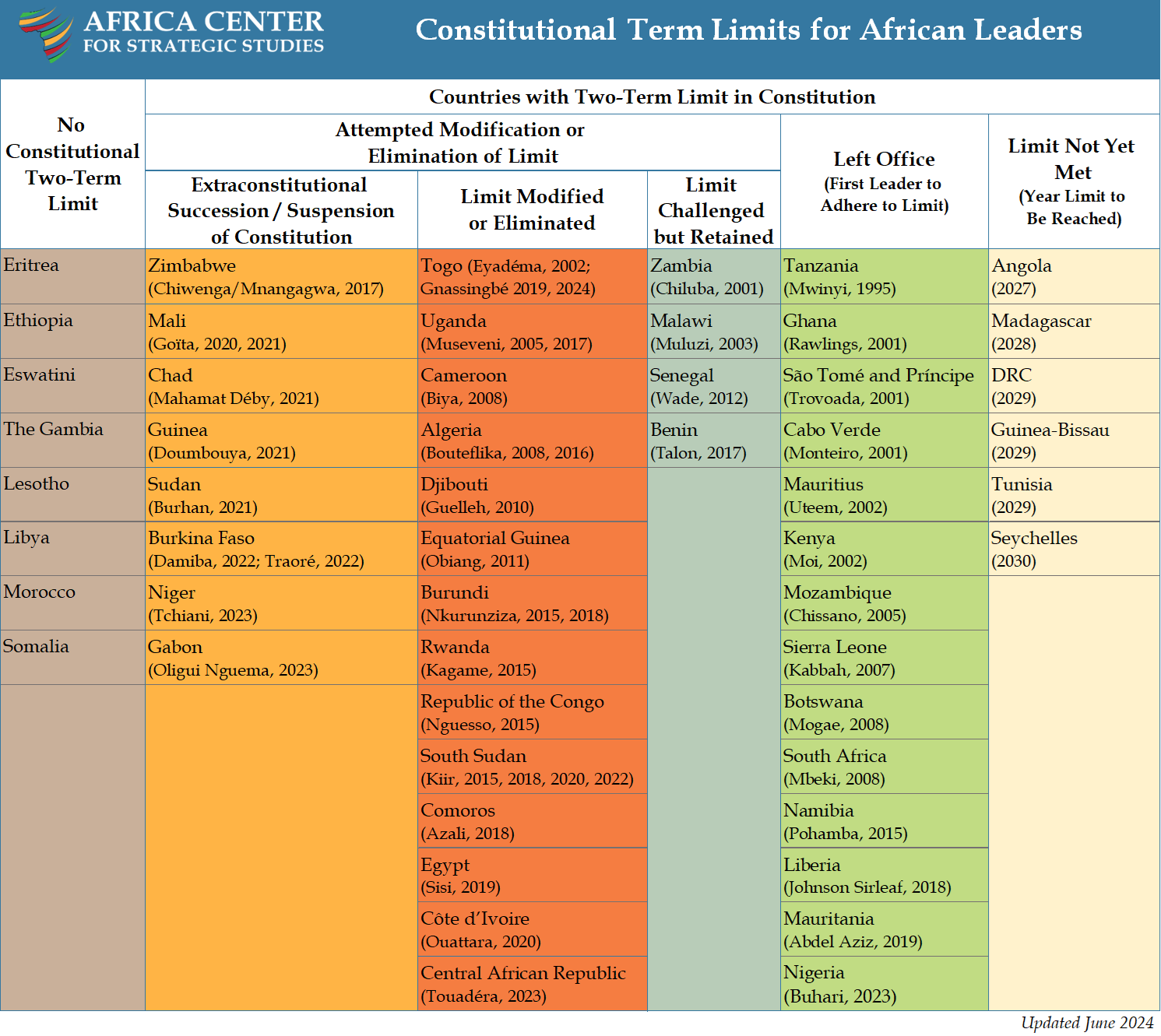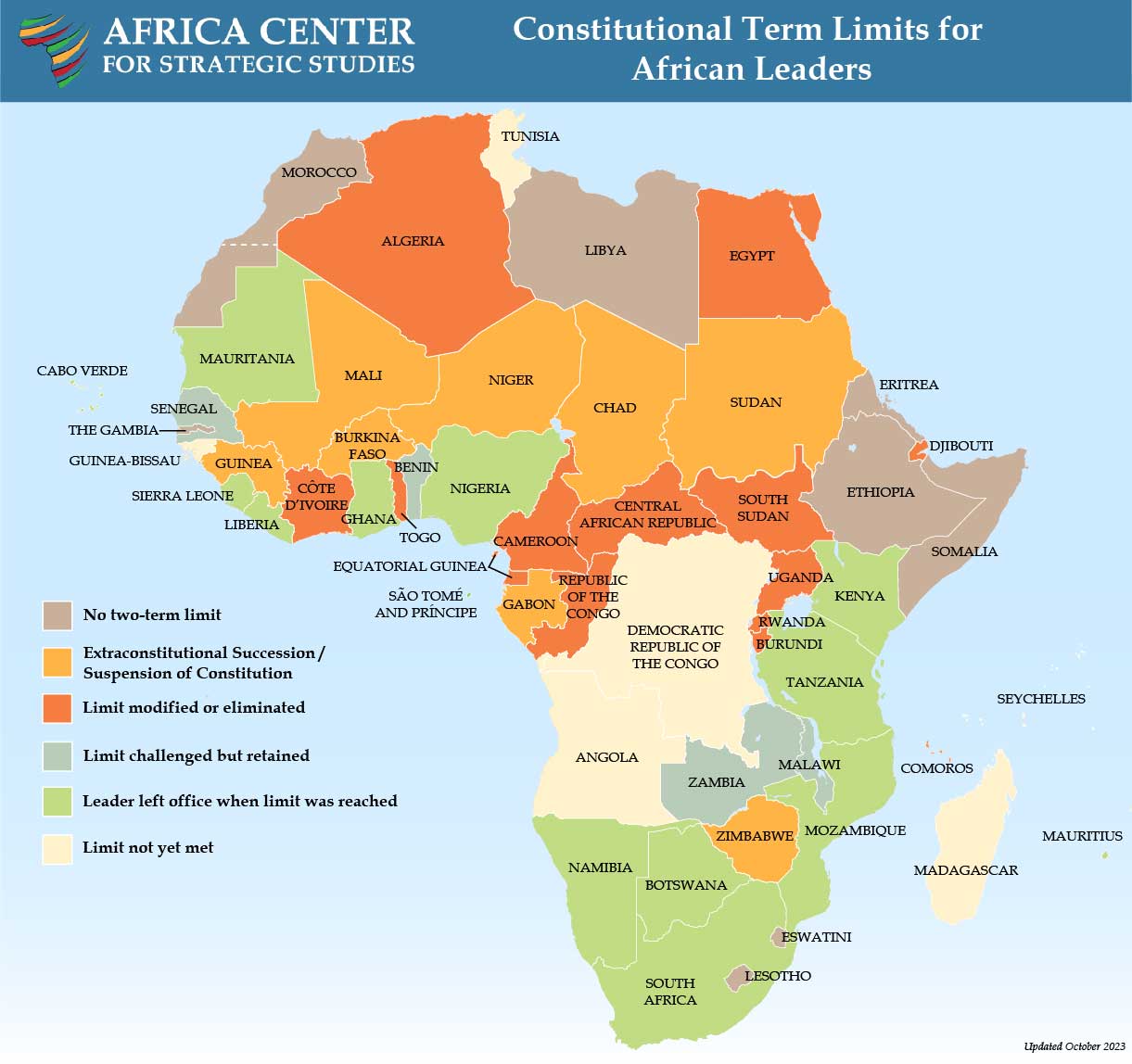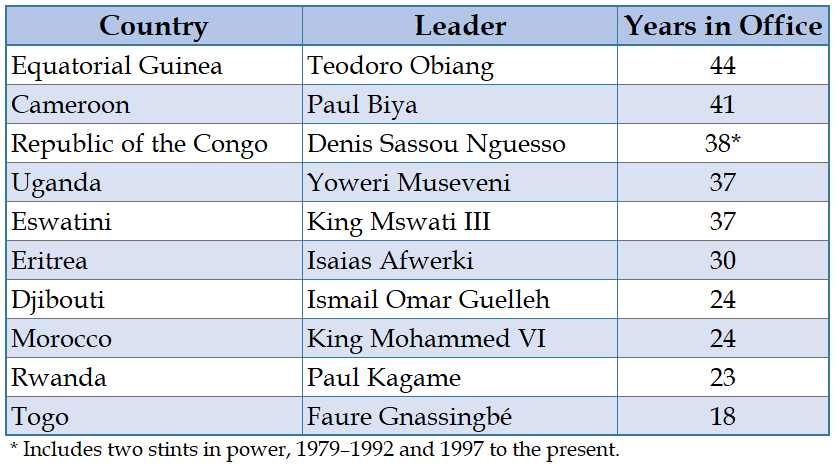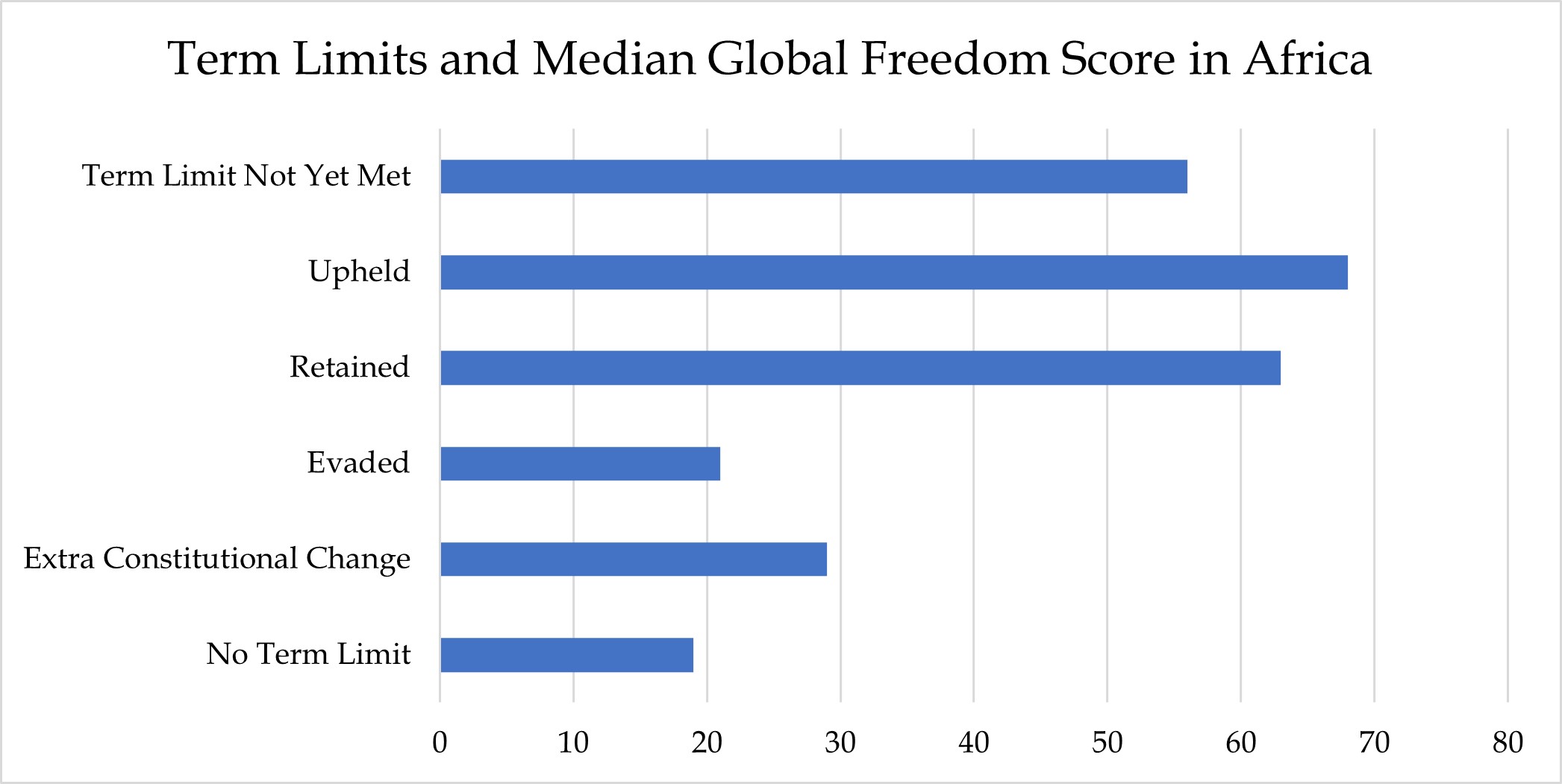
(Click here for printable PDF of this table)
 (Click here for printable PDF of this map)
(Click here for printable PDF of this map)
Highlights
- Extraconstitutional extensions of power have shaped the contours of Africa’s governance landscape in recent years. Leaders of 14 African countries have held onto power for more than two terms after evading term limits. This continues a pattern of term limit evasion observed since 2015, reversing an evolving trend of term limit adherence between 2000–2015.
- Another eight African countries have endured military coups that suspended or disrupted their constitutions since 2015. In none of these cases have the military authorities demonstrated a commitment to relinquishing power, thereby effectively eliminating term limit provisions that had been in place.
- Combined with an additional 8 countries that do not have any existing term limit restrictions, 30 out of 54 African countries (56 percent) are operating without functioning limits on an executive’s time in power.
- Notably, 18 African countries are actively upholding term limit norms, including the noteworthy case of Nigerian President Muhammadu Buhari who stepped down after his two terms in office. Another six countries have term limit restrictions on the books, though these have yet to be applied.
- Upholding term limits has direct effects on leaders’ and regimes’ longevity in power. The average time in office for the 18 leaders in countries that uphold term limits is 5 years. For the 14 leaders who have evaded term limits, the median time in office is 16 years.
- These figures understate the stranglehold on power effected by term limit evasions, however. The current authorities in Algeria and Burundi, for example, replaced longtime leaders who had previously evaded term limits. They, like the dynastic succession in Togo, represent a continuation of these regimes rather than a fresh start. When that is considered, the median time in power for regimes in the “term limit modified” category expands to 26 years.
Coup Leaders and Military Governments are Allergic to Term Limits
- Term limit evasions are also directly linked to the surge of coups observed in Africa. Five of the eight countries that have suffered coups since 2015 had leaders who evaded term limits—Chad, Gabon, Guinea, Sudan, and Zimbabwe. The median time in office for those deposed leaders was 30 years.
- This highlights that extraconstitutional actions of one type (i.e., term limit evasions) beget extraconstitutional actions of another (i.e., seizures of power via military coups).
- Africa’s recent coups should not be misinterpreted as reformist, however. Military coups that occurred within already authoritarian governments—Chad, Gabon, Sudan, and Zimbabwe—were led by actors who were a part of or worked closely with the previous regime. Accordingly, they are a continuation of the closed power structures that have dominated these countries—and disregarded term limits—for decades.
- The coups against democratically elected leaders in Niger, Mali, and Burkina Faso, furthermore, are attempts to restore military governance in countries with long (and disastrous) legacies of military rule. In each of these cases, the coups have jettisoned nascent norms of leaders respecting term limits.
- The relationship between military government and term limit evasions operates in both directions. Ten of the fourteen leaders who have evaded term limits have come to power via military coup, civil conflict, or military support. In other words, leaders who gained power through extraconstitutional means, subsequently tend to violate legal constraints on their time in power.
Damaging Implications for Governance
- The evasion of term limits is directly responsible for the prolonged tenures of certain leaders. Ten African leaders have been in power for 18 years or longer. All of these have evaded term limits or are in countries without them.

- The evasion of term limits has broader consequences for democratic governance in Africa. The median score on Freedom House’s Global Freedom Index, which measures the upholding of civil liberties and political rights, is 65 for African countries that uphold term limits (on a scale of 0–100). In countries where leaders have evaded these limits, the median score is only 21.

Data source: Freedom House
- The stark variation in governance scores accentuates that term limit evasions are rarely isolated events. Rather, they are typically part of a pattern of leaders undermining the rule of law and restricting civil and political liberties. The median ranking on Transparency International’s 180-country Corruption Perceptions Index is 83 for African countries that have upheld term limits. This compares to a median ranking of 142 for countries where those limits were evaded—a 60-place difference.
- Term limit evasions are linked to other serious governance failures. Just under 40 percent of countries where leaders have evaded term limits or term limits do not exist are in conflict. In contrast, just 11 percent of countries that have upheld or retained term limits are in conflict (i.e., 2 out of 18 countries, with Nigeria and Mozambique being the exceptions).
- Strong regional patterns with regards to upholding term limits are apparent. Central Africa is the locus of term limit evasions with leaders in seven countries having bypassed these limits. While West Africa has been the focal point for the surge of coups observed on the continent in recent years, the region is also a leader in upholding term limits, with eight countries having done so. This illustrates the sharply divergent visions for governance norms playing out in the region and across the continent. Southern Africa is also distinctive. With the notable exception of Zimbabwe, Southern Africa has largely institutionalized the process of executive transitions after two terms in office.
Algeria: A limit of two 5-year terms was reinstated in 2016, theoretically allowing Abdelaziz Bouteflika to run for a fifth term in 2019. Though the ailing Bouteflika was subsequently replaced by Abdelmadjid Tebboune, this is widely considered a perpetuation of the long dominant power structure.
Burkina Faso: A two-term limit with an unamendable provision had been included in the draft 2017 constitution that was to be put to referendum. Two military coups in 2022 and the suspension of the constitution has sidelined these provisions.
Burundi: Following Pierre Nkurunziza’s violation of an explicit two-term limit to pursue a controversial third term in 2015, a new constitution extended presidential terms from 5 to 7 years in 2018. General Évariste Ndayishimiye who succeeded Nkurunziza in 2020 is seen as a continuation of the ruling CNDD-FD’s monopolization of power.
Cabo Verde: The elected president is term limited, though power is shared with a prime minister, who is not.
CAR: A controversial 2023 constitutional referendum extended presidential terms from five to seven years and removed the two-term limit, allowing Faustin-Archange Touadéra to remain in power indefinitely. CAR’s 2016 constitution specifically prohibited the amendment of term limits for any reason.
Chad: A new constitution reinstated a two-term limit and changed terms from 5 to 6 years in 2018, allowing Idriss Déby to run for a sixth term in 2021. Following his death in 2021, a military coup installed his son, Mahamat Déby, as president, bypassing the constitution. While promising to transition to democratic civilian government, the junta has not taken credible steps to open the political process.
Comoros: A new constitution, approved in a controversial 2018 referendum, allows the president to run for two consecutive 5-year terms, abolishing the one-term rotational system of power sharing among the islands. The 2018 referendum reset the clock, allowing Azali Assoumani to run for three terms (2016, 2019, 2024). He had also already been president from 2002–2006 for one term after taking power in a military coup in 1999.
Republic of the Congo: Denis Sassou-Nguesso served three presidential terms from 1979–1991. He returned to power in 1997 after toppling the government in a military rebellion. A new constitution in 2015 removed the age limit, reduced term length from 7 years to 5, and extended the term limit to three terms.
Côte d’Ivoire: The adoption of a new constitution in 2016 enabled Alassane Ouattara to run for a third term in 2020 and theoretically a fourth term in 2025.
DRC: Felix Tshisekedi is contesting for a second term in 2023 following controversial elections in 2018. This follows Joseph Kabila’s extending his time as president by two years even though his second term ended in 2016.
Egypt: A controversial constitutional amendment in 2019 extended Sisi’s second 4-year term by 2 years and allows him to run for an additional 6-year (third) term that would end in 2030.
Equatorial Guinea: A new constitution in 2011 introduced a two-term limit of seven years and removed the age limit, resetting the clock on Teodoro Obiang’s continuation of power since 1979.
Eswatini: Executive authority rests with a monarch.
Ethiopia: Executive authority largely rests with the office of the prime minister, which does not face restrictions on tenure.
Gabon: The August 2023 military coup suspended the constitution following President Ali Bongo Ondimba’s third term reelection, ending the 56-year Bongo family dynasty. Term limits had previously been eliminated by Omar Bongo in 2003.
The Gambia: Constitution does not include term limits. The 2020 Draft Constitution Bill, which included a two-term limit of 5-year terms, failed to pass in parliament.
Guinea: A new constitution passed in a controversial 2020 referendum allowed Alpha Condé to run for a third term in 2020. A September 2021 military coup has suspended the constitution.
Lesotho: Executive authority largely rests with the office of the prime minister, which does not face restrictions on tenure.
Libya: A two-term limit has been included in the draft constitution.
Mali: Mali’s military junta suspended the constitution in August 2020. A second military coup in May 2021 has led to repeated postponements of the transition to civilian rule.
Mauritius: The elected president is term limited, though power is shared with a prime minister, who is not.
Morocco: Executive authority rests with a monarch.
Niger: Niger’s presidential guard overthrew the democratically elected president, Mohamed Bazoum, in July 2023. This upended Niger’s precedent for upholding term limits following President Mahamadou Issoufou’s stepping down following his second term in 2021.
Rwanda: A controversial 2015 referendum allowed Paul Kagame a third 7-year term after which he may run for two 5-year terms, potentially remaining in power to 2034.
São Tomé and Príncipe: The elected president is term limited, though power is shared with a prime minister, who is not.
South Sudan: Salva Kiir has only been elected once in 2010. However, constitutional amendments and extensions in 2015, 2018, 2020, and 2022 have extended his tenure which is now set to expire in 2024.
Sudan: In August 2018, the ruling National Congress Party decided to pursue a constitutional amendment to remove term limits to allow Omar al-Bashir to extend his 30-year rule to run for a third term in 2020. The military-led transitional government that took power in 2019 mounted a subsequent coup in October 2021 to derail the planned transition to civilian government. Conflict between military factions has effectively turned Sudan into a collapsed state.
Togo: A two-term limit was removed in 2002 under Eyadéma Gnassingbé. A constitutional amendment reinstating the two-term limit in 2019 was used to justify resetting the clock and allowing Faure Gnassingbé to run for a fourth term in 2020. A controversial new Constitution was adopted without public debate in 2024 establishing a new executive position of President of the Council of Ministers to be elected by the National Assembly and Senate for a term of six years, renewable indefinitely. This eliminates citizens’ right to vote directly for the head of state. The new Constitution retains a figurehead President who is subject to a two-term limit of four years. These changes would enable Faure Gnassingbé to remain in power indefinitely and perpetuate the Gnassingbé family dynasty in place since 1967.
Tunisia: A two-term limit was introduced in the 2014 post-revolutionary constitution. After announcing that he would rule by decree in 2021, President Kais Saied pushed through a controversial constitutional referendum in 2022, boycotted by the opposition, that removed the provision that the constitution could not be amended to increase the number of terms.
Uganda: Presidential term limits were lifted in 2005, and the age limit was removed in 2017. This allows Yoweri Museveni, now in his 6th term, to rule indefinitely.
Zimbabwe: The military ouster of Robert Mugabe in 2017 and the subsequent installation of Emmerson Mnangagwa as president, through elections deemed to lack credibility, has enabled the perpetuation of over four decades of ZANU-PF domination. The 2013 constitutional referendum under Mugabe introduced a two-term limit of 5-year terms. Prior to the 2013 constitution, the president was elected for a 6-year term with no term limits.
More on: Democracy Africa’s Crisis of Coups

